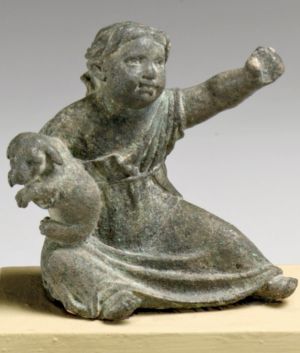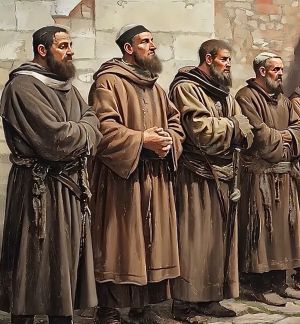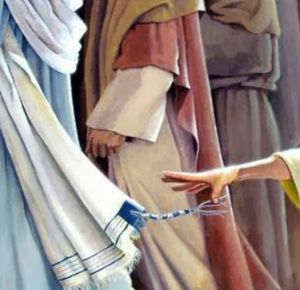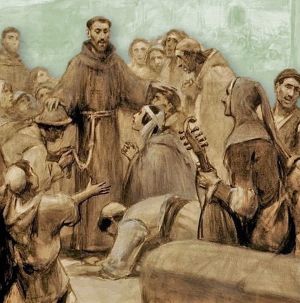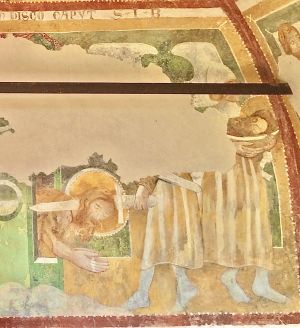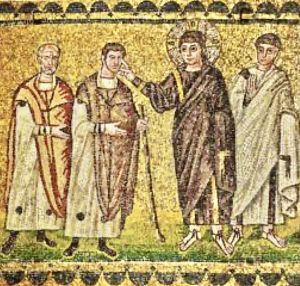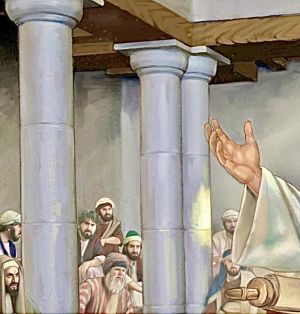
Teresa Girolami
Teresa Girolami è laureata in Materie letterarie e Teologia. Ha pubblicato vari testi, fra cui: "Pellegrinaggio del cuore" (Ed. Piemme); "I Fiammiferi di Maria - La Madre di Dio in prosa e poesia"; "Tenerezza Scalza - Natura di donna"; co-autrice di "Dialogo e Solstizio".
In the passage from Mark, the sincere and indomitable faith of a Syro-Phoenician woman is narrated, who asks and obtains from Jesus - precisely by Faith - the deliverance of her little daughter.
The Holy Spirit has a way of bestowing charisms on the small and simple; thus He gave Francis the healing power from many evils and the power of deliverance from the evil one, the tyrant of so many creatures.
Wisdom, which is nobler than all motion and penetrates everywhere by its purity, communicates itself to holy souls and forms friends of God and prophets. Thus in the soul of the Poor Man.
The Sources illustrate numerous healings and deliverances of the possessed by Francis, and describe the growing faith in those who had received the saving gift.
Yes, because the evangelical consequence of these healings is the extensive manifestation of people's active belief, in a sincere and humble manner.
We read in the Sources:
"Once the Saint appeared to a woman from Narni, who was furious and so out of her mind that she did and said frightful and filthy things, and said to her:
«Make a sign of the cross».
She replied that she was prevented from doing so.
Then Francis himself impressed it on her forehead, and instantly she was freed from madness and all demonic influence.
Countless have been the unhappy men and women who, tormented in various ways and by manifold deceptions by demons, were delivered by virtue of the merits of the glorious father" (FF 555).
Francis was very attentive to the ills of the people he met.
He was often seized with great compassion when he saw a creature asking for help in an exasperated and insistent manner.
The documentation of the Sources is permeated by this tenacious and humble logic of the Saint, who, even before the concrete fact, perceived in his innermost being the profound need for the complete salvation of the other.
He believed, in fact, that when a man takes pity on another man, there, God is resurrected, and the Good News is proclaimed.
«For this word of yours, go; the devil has gone out from your daughter» (Mk 7:29)
Thursday, 5th wk. in O.T. (Mk 7,24-30)
Jesus teaches the crowd and explains: what makes one impure is what comes from the heart.
Francis, pure in heart, transparent in his intentions and intentions, had also introduced in the Admonitions he wrote a clear guiding call for his brothers - on the merits of behaviour.
In the Sources:
«When we live according to the flesh, the devil wants to take away from us the love of [our Lord] Jesus Christ and eternal life, and wants to lose himself with everyone in hell; for we through our own fault are ignoble, miserable, and contrary to good, ready instead and willing for evil, because, as the Lord says in the Gospel: Out of the heart proceed and come forth evil thoughts, adulteries, fornications, murders, thefts, covetousness, wickedness, deceit, impudiciousness, envy, false witness, blasphemy, [pride], foolishness. All these evil things proceed from within the heart of man, and it is these things that defile man.
Now instead, since we have left the world, we have nothing to do but to follow the will of the Lord and to please Him alone» (FF 57).
In this way he instructed his brothers in the way of purity.
And in the Vita Prima of Celano, regarding his brothers:
"And this is what they always used to do when they came to him; they did not hide even the slightest thought and involuntary motions of their souls from him, and after having accomplished all that was commanded them, they still considered themselves useless servants.
And truly «purity of heart» filled that first group of the blessed Francis' disciples to such a degree that, although they knew how to do useful, holy and upright things, they showed themselves utterly incapable of drawing vain pleasure from them.
Then blessed Francis, clasping his sons to himself with great love, began to manifest to them his plan and what the Lord had revealed to him" (FF 370).
Magnificence of the little ones!
«What comes out of man, that makes man unclean» (Mk 7:20)
Wednesday 5th wk. in O.T. (Mk 7,14-23)
Mk highlights the comparison between Jesus and the scribes and Pharisees, whom He reproaches for the hypocrisy of appearances - worshipping their tradition instead of God Himself - and neglecting the commandment of Love.
Francis of Assisi detested appearances, rituals observed for mere vanity, honour to God given with the lips and not with the adherence of the heart; failing the commandment of Love, the Substance of God.
He resented the hypocrisy of 'ablutions' that misunderstand the charity to be extended to one's neighbour.
He urged his brothers to bear witness to the Gospel with boldness, proclaiming the Word at every opportunity; without kneeling to abstract precepts.
Looking at the episodes that recall this new sense of purity, a passage from the Sources is particularly interesting:
The brethren, in their all-interior ideal "When they met a church or a cross along the way, they would bow down to recite a prayer and say devoutly:
«We adore thee, O Christ, and bless thee for all thy churches scattered throughout the world, for thou hast redeemed them by thy holy cross».
They were convinced, in fact, that they were in a holy place, wherever they encountered a cross or a church.
Everyone who saw them was greatly astonished, because of their way of dressing and living that was so different from any other: they looked like woodland creatures.
Wherever they entered, be it a city, a castle, a village, a dwelling, they proclaimed peace, exhorting men and women to fear and love the Creator of heaven and earth, and to keep his commandments.
There were those who listened to them willingly and those who, on the contrary, mocked them.
Mostly they were pelted with a storm of questions [...].
Although it was annoying to answer so many questions, they confessed with simplicity that they were penitents from Assisi [...]" (FF 1441).
Free from ceremonial, they proclaimed the Kingdom of God with authenticity and not only with their lips, but with the testimony of their lives, which emphasised the Word read and prayed.
They were not slaves to useless observances of custom, but tenacious servants of the Gospel at all costs.
Jesus' warning was not directed at them:
«Setting aside the commandment of God, keep the tradition of men» (Mk 7:8).
Rather, this admonition concerns those who take glory from one another, neglecting what pleases God.
«Artfully you set aside the commandment of God, to observe your own tradition» (Mk 7:9)
Tuesday, 5th wk. in O.T. (Mk 7,1-13)
The evangelist Mk shows how, as Jesus passed by, people everywhere flocked to carry on stretchers the sick to be healed.
Following in the footsteps of the Master, Francis performed healings in every place.
He had received special charisms in favour of the people, who wanted to touch him to be healed.
In the Sources, there is an interesting and moving episode in this regard.
In Susa, a young man from Rivarolo Canavese, named Ubertino, who had entered the Order of Friars Minor, after a terrible fright, became insane and was struck by paralysis in his right side, losing sensibility, motion, hearing and speech.
The brothers were distressed to see him lying in his bed in that state.
On the eve of St Francis he had a moment of lucidity and began to invoke his father in a heartfelt way.
At the hour of matins, while all the brothers were in choir, the blessed father appeared to the novice in the infirmary, causing a great light to shine in the house.
The father placed his hand on his right side, running it down to his feet; he put his fingers in his ear and made a special sign on his right shoulder, saying:
"This will be for you the sign that God, using me, whom you wished to imitate by entering Religion, has restored you to perfect health" (FF 1325).
Then he put on the girdle and said to him:
"Get up and go to church to devoutly celebrate, together with the others, the prescribed praises of God" (FF 1325).
The young man tried to touch him with his hands and kiss his feet, as a sign of thanksgiving, but the blessed father disappeared from his sight.
The young man then went into the church to celebrate the praises now healed, to the amazement of the onlookers.
Francis, an apostle of resurrection, in life and in death worked many healings in the bodies and hearts of many people.
These wanted to touch his tunic, his cloak, his hood, firmly believing that they could be healed and regain faith in the God who had sent him.
«And they begged him to touch even the fringe of his cloak; and as many as touched him were saved» (Mk 6:56)
Monday, 5th wk. in O.T. (Mk 6,53-56)
Jesus calls us to bear essential witness, to give our whole lives, to be salt and light for everyone.
Francis, in his journey of faith, sought to please God with a flavourful existence and a luminous life, irrigated by Grace.
Chiara herself, always united with her Spouse Jesus, was prophetically chosen to be what her name meant: light, brightness for the world.
Their witness shines forth in the Sources.
In Brother Elia's Letter, written immediately after Francis' death, the experience of the friars alongside their father and the fragrance of life they breathed is evident.
"Truly, the presence of our brother and father Francis was the true light, not only for us who were his companions in the same profession of life, but also for those who were far away.
He was, in fact, a light raised up by the true light, the one that illuminates those who were in darkness and sat in the shadow of death, to direct their steps on the path of peace.
This he did, like the true meridian light.
The light that came from above illuminated his heart and warmed his will with the fire of his love" (FF 307).
This is the experience of those who knew him closely.
But Clare herself, in the correspondence compiled for the wonderful dialogue with Agnes of Bohemia, offers passages that are the measure of her heart and her luminous life.
In the fourth letter we read:
«And since this vision of him is the splendour of eternal glory, the brightness of everlasting light and a spotless mirror, every day bring your soul, O Queen, bride of Jesus Christ, to this mirror and gaze continually at your face in it, so that you may adorn yourself entirely, inside and out, clothed and surrounded by variety, and be equally adorned with the flowers and garments of all virtues, as befits you, beloved daughter and bride of the supreme King» (FF 2902).
In Francis and Clare, purity had reached such levels that the whole machinery of the world, as St Bonaventure says, was placed at the service of the sanctified senses of these two splendid figures.
In their poor and simple existence, everything became a clear and profound testimony to the praise of God.
Clare of Assisi was, like her master and father, the incarnate splendour of the Holy Word. With her endless clarity, she was an echo of the Risen One, Light from Light.
Francis was salt that made the daily life of the poor and the rich savoury; salt that revolutionised his era and that still today, eight hundred years after his death, gives meaning to the life of every person, questioning them about what they seek and follow.
His madness - as it was considered in his day - proved to be evangelical wisdom.
His salt still attests to the validity of the path embraced in unity with Christ; his choice is the flavour of salt in a sometimes insipid world.
«Let your light shine before others, so that they may see your good works and give glory to your Father in heaven» (Mt 5:16)
5th Sunday in O.T. A (Mt 5:13-16)
City set on a Mount. Light and Salt of Francis and Clare
In today's Gospel Jesus invites his own to a deserted place, in the background. The throng of the crowd did not even allow them to eat.
But the Lord first of all feels compassion for the people who followed him, because they were like sheep without a shepherd.
Assiduous contemplation and purity of life had made Francis powerful, by grace, even over the forces of evil, making him a credible witness to the Lord through numerous healings.
The Sources eloquently illuminate in this regard:
"People of all ages [...] ran to see and hear that new man.
He pilgrimaged through the various regions, fervently proclaiming the Gospel; and the Lord cooperated, confirming the Word with the miracles that accompanied it.
Indeed, in the name of the Lord, Francis, preacher of the truth, cast out demons, healed the sick" (FF 1212).
Once "I do not know how to qualify the horrible illness from which a brother suffered, some attributed it to the presence of an evil devil.
The poor man would often throw himself to the ground and, squinting his eyes in a horrible way, he would foam at the mouth; his limbs would now contract, now stretch, now stiff, now bent and twisted [...].
The saint Francis had immense compassion for him, went to him, blessed him, humbly praying to God, and the sick man obtained prompt and complete health and never suffered such an evil again" (FF 440).
"In Città di Castello a woman was possessed by an evil and furious spirit: as soon as the Saint [...] had obediently ordered [him to come out of her], the demon fled full of indignation, leaving the poor obsessed woman free in body and soul" (FF 1219)
Francis had married the Light, obscuring the power of evil.
The Minim had compassion on the tired and exhausted crowds that followed him and, in prayer, his constant refuge, he asked God for labourers for the abundant harvest.
He also asked his brothers to pray much for this cause.
Like Jesus, the Saint travelled through all the towns and villages, preaching the Gospel of the Kingdom and healing every sickness and every infirmity.
«And as he went out he saw many crowds and had compassion on them, for they were like sheep that have no shepherd, and he began to teach them many things» (Mk 6:34)
Saturday, 4th wk. in O.T. (Mk 6:30-34)
The evangelist Mark illustrates the circumstances of the Baptist's martyrdom.
Herod wanted to have John killed for fear of revolts, and because he reproached him for his offences.
But he feared the crowd, who considered him a prophet.
The theme of persecution combined with the people's favour for the man of God is also present in St Francis.
In the Sources we read:
"Since the herald of Christ was famous for these and many other prodigies, the people paid attention to his words, as if he spoke as an Angel of the Lord.
For the prerogative of the lofty virtues, the spirit of prophecy, the thaumaturgic power, the mission to preach coming from heaven, the obedience of creatures deprived of reason, the sudden conversions of hearts brought about by hearing his word, the knowledge infused by the Holy Spirit and superior to human doctrine, the authorisation to preach granted by the Supreme Pontiff by divine revelation, as well as the Rule, which defines the form of preaching, confirmed by the Vicar of Christ himself and, finally, the signs of the Supreme King impressed like a seal on his body, are like ten testimonies for the whole world and confirm without a shadow of a doubt that Francis, the herald of Christ, is worthy of veneration for the mission received, authentic in the doctrine taught, admirable for his holiness and that, therefore, he preached the Gospel of Christ as a true envoy of God" (FF 1221).
For this he too encountered persecution.
But to his brothers, in the Regola non bollata, he reminds them:
"And let all the brothers, wherever they are, remember that they have given themselves and abandoned their bodies to our Lord Jesus Christ.
And for his love they must expose themselves to enemies both visible and invisible, for the Lord says:
«He who loses his soul for my sake will save it for eternal life» " (FF 45).
Francis sacrificed his whole self on the altar of charity and poverty for the sake of the Kingdom, leaving everyone a shining example.
«And immediately the king sent a guard and ordered his head to be brought in, and went and beheaded him in the prison» (Mk 6:27)
Friday, 4th wk. in O.T. (Mk 6:14-29)
In the Regola bollata (1223) Francis of Assisi writes to his brothers:
«In whatever house they enter they are to say, first of all: Peace to this house; and, according to the holy Gospel, it is lawful for them to eat all the food that will be presented to them» (FF 86).
A poor, essential behaviour, suited to the circumstances, without pretence.
A style that also concerns the singular equipment of the route:
«And he commanded them to take nothing on the way except a staff only, neither bread nor saddlebags nor copper for a belt, but having put on sandals not to wear two tunics» (Mk 6:8-9).
All this constituted ‘the pilgrim's kit’ for the sake of Christ and his almighty Word.
For himself and his first companions, Francis had wondered a lot about how to follow the Gospel.
One day*, he entered St Peter's church, where the passage on the mandate given to the Apostles was being read.
"After Mass, he asked the priest to explain the passage to him*. The priest commented on it to him point by point, and Francis, hearing that the disciples of Christ must possess neither gold, nor silver, nor money, nor carry saddlebags, nor bread [...] but only preach the Kingdom of God [...] immediately, exulting in the Holy Spirit, exclaimed:
«This I want, this I ask, this I long to do with all my heart!»” (FF 356).
And without any delay, full of joy, he set about to fulfil the salutary admonition and all the teachings he had heard.
The Sources continue:
"For he had never been a deaf hearer of the Gospel, but, entrusting everything he heard to a commendable memory, he sought with all diligence to carry it out to the letter" (FF 357).
From then on, with great fervour, Francis began to preach penance, edifying everyone with the simplicity and effectiveness of his word and the magnificence of his heart.
He began his preaching precisely in the church of St. George, where he had his first rudiments of Latin and religious instruction, where he had learned to read, and where he later had his first burial.
Poor, he began to sow the Good News; bare of everything.
And naked he gave himself to the Good News until the end of his life.
*The event may have happened either on 12 October (feast of St Luke) or 24 February 1209 (feast of St Matthias), on which days the Gospel of the Apostles' mission is read.
Thursday, 4th wk. in O.T. (Mk 6,7-13)
Chapter 6 of Mark's Gospel highlights the rejection of Jesus by the inhabitants of Nazareth.
The Lord is amazed at the unbelief found in his homeland and the contempt reserved for him, so much so that he could not perform any miracles there.
Like Jesus, so is his disciple. Following in Christ's footsteps, Francis of Assisi also wished that the people of his time had been builders and choristers of other dreams. But in his life he met (and with him his friars) men in whom the inability to recognise the figure of the divine in the human often dwells.
A hardness that goes hand in hand with that contempt for the prophetic and that tends to nullify what is revolutionary in the spirit of the Poor Man: the happy intuition of the valorisation of the person.
We find in the authoritative Sources:
"If Guido [a benefactor] treated them with such regard, others instead covered them with contempt. People of high and lowly status mocked and maligned them, even to the point of stripping them of their miserable garments.
The servants of God remained naked because, according to the evangelical ideal, they wore nothing but that one piece of clothing, and moreover they did not demand the return of what was taken from them [...].
Some threw mud on them; others put dice in their hands, inviting them to play; still others, grabbing them from behind by the hood, dragged them on their backs.
These and other such wickednesses were inflicted on them, because they were thought to be such mean beings, that they could be scrambled at will.
Together with hunger and thirst, with cold and nakedness, they endured tribulations and sufferings of all kinds.
But they bore everything with imperturbable patience, according to the admonition of Francis" (FF 1444).
«No prophet is despised except in his own country and among his own kin and household» (Mk 6:4)
Wednesday 4th wk. in O.T. (Mk 6,1-6)
Anyone who welcomes the Lord into his life and loves him with all his heart is capable of a new beginning. He succeeds in doing God’s will: to bring about a new form of existence enlivened by love and destined for eternity (Pope Benedict)
Chi accoglie il Signore nella propria vita e lo ama con tutto il cuore è capace di un nuovo inizio. Riesce a compiere la volontà di Dio: realizzare una nuova forma di esistenza animata dall’amore e destinata all’eternità (Papa Benedetto)
You ought not, however, to be satisfied merely with knocking and seeking: to understand the things of God, what is absolutely necessary is oratio. For this reason, the Saviour told us not only: ‘Seek and you will find’, and ‘Knock and it shall be opened to you’, but also added, ‘Ask and you shall receive’ [Verbum Domini n.86; cit. Origen, Letter to Gregory]
Non ti devi però accontentare di bussare e di cercare: per comprendere le cose di Dio ti è assolutamente necessaria l’oratio. Proprio per esortarci ad essa il Salvatore ci ha detto non soltanto: “Cercate e troverete”, e “Bussate e vi sarà aperto”, ma ha aggiunto: “Chiedete e riceverete” [Verbum Domini n.86; cit. Origene, Lettera a Gregorio]
In the crucified Jesus, a kind of transformation and concentration of the signs occurs: he himself is the “sign of God” (John Paul II)
In Gesù crocifisso avviene come una trasformazione e concentrazione dei segni: è Lui stesso il "segno di Dio" (Giovanni Paolo II)
Only through Christ can we converse with God the Father as children, otherwise it is not possible, but in communion with the Son we can also say, as he did, “Abba”. In communion with Christ we can know God as our true Father. For this reason Christian prayer consists in looking constantly at Christ and in an ever new way, speaking to him, being with him in silence, listening to him, acting and suffering with him (Pope Benedict)
Solo in Cristo possiamo dialogare con Dio Padre come figli, altrimenti non è possibile, ma in comunione col Figlio possiamo anche dire noi come ha detto Lui: «Abbà». In comunione con Cristo possiamo conoscere Dio come Padre vero. Per questo la preghiera cristiana consiste nel guardare costantemente e in maniera sempre nuova a Cristo, parlare con Lui, stare in silenzio con Lui, ascoltarlo, agire e soffrire con Lui (Papa Benedetto)
In today’s Gospel passage, Jesus identifies himself not only with the king-shepherd, but also with the lost sheep, we can speak of a “double identity”: the king-shepherd, Jesus identifies also with the sheep: that is, with the least and most needy of his brothers and sisters […] And let us return home only with this phrase: “I was present there. Thank you!”. Or: “You forgot about me” (Pope Francis)
Nella pagina evangelica di oggi, Gesù si identifica non solo col re-pastore, ma anche con le pecore perdute. Potremmo parlare come di una “doppia identità”: il re-pastore, Gesù, si identifica anche con le pecore, cioè con i fratelli più piccoli e bisognosi […] E torniamo a casa soltanto con questa frase: “Io ero presente lì. Grazie!” oppure: “Ti sei scordato di me” (Papa Francesco)
Thus, in the figure of Matthew, the Gospels present to us a true and proper paradox: those who seem to be the farthest from holiness can even become a model of the acceptance of God's mercy and offer a glimpse of its marvellous effects in their own lives (Pope Benedict))
Nella figura di Matteo, dunque, i Vangeli ci propongono un vero e proprio paradosso: chi è apparentemente più lontano dalla santità può diventare persino un modello (Papa Benedetto)
duevie.art
don Giuseppe Nespeca
Tel. 333-1329741
Disclaimer
Questo blog non rappresenta una testata giornalistica in quanto viene aggiornato senza alcuna periodicità. Non può pertanto considerarsi un prodotto editoriale ai sensi della legge N°62 del 07/03/2001.
Le immagini sono tratte da internet, ma se il loro uso violasse diritti d'autore, lo si comunichi all'autore del blog che provvederà alla loro pronta rimozione.
L'autore dichiara di non essere responsabile dei commenti lasciati nei post. Eventuali commenti dei lettori, lesivi dell'immagine o dell'onorabilità di persone terze, il cui contenuto fosse ritenuto non idoneo alla pubblicazione verranno insindacabilmente rimossi.


